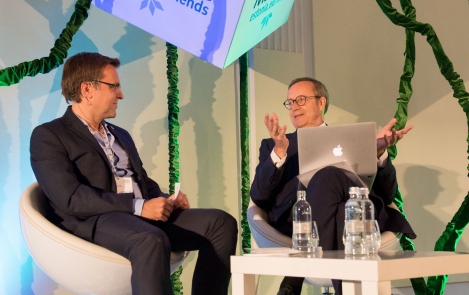-
Reset
+


President Ilves: restrictions on labour migration will also mean the end of the common market
01.07.2016
"The free movement of capital, goods, services and people is the fundamental pillar of the European Union and one freedom cannot be separated from the others. Restrictions on labour migration will also mean the end of the common market," said President Toomas Hendrik Ilves today in the House of the Blackheads within the framework of the Estonia's Friends International Meeting symposium "Quo vadis, Estonia? Quo vadis, Europe?", at which the general influence and meaning of the UK referendum on leaving the European Union was also discussed.
"One freedom cannot be separated from the others. The UK only stands to gain from the free movement of labour; in fact, they need it," stated President Ilves, in commenting on the common understanding that the dissatisfaction of the British people with foreign labour was one of the main reasons for the Brexit referendum result.
According to the Head of State, post-referendum emotions on Europe are often conflicting, and it is easy to speculate on what the meaning of the departure of the UK from the European Union will be in terms of our security and common market. He admitted that the scope of influence of the referendum will be extensive and the decision of the UK could probably be seen as the second most important event in Europe after the collapse of the Iron Curtain.
"We must give the UK some time. Those who promoted Brexit in the United Kingdom had no plan of what to do if the referendum had the desired effect," President Ilves said, and added: And we also do not have any answers."
According to President Ilves, the European Union is facing a huge crisis but there is still no reason for a hysterical response.
He invited people to be careful about forming "clubs" or groups of interested Member States within the framework of the negotiations within the European Union, as these will only harm the common spirit of the European Union and will result in alienation between Member States.
The Head of State emphasised his concerns about the rise of populist political forces in democratic countries that use the falsification of facts as the core of their campaign. According to President Ilves, this is not characteristic of the UK only, but as populist parties gain strength it has also been employed in Europe and the United States of America in general.
"In Europe, the rise of populism has been observed for the last seven or eight years. Populist campaigns are not based on facts, but rather lies; and once this become a standard, we will face a serious problem," stated the Estonian Head of State.
He also mentioned the responsibility of the shapers of domestic policies as one of the lessons: "We often hear statements – OK, quite rarely in Estonia – that Brussels told us to adopt one or other decision. However, if something good is built with funding from the European Union or Brussels, everyone will eager to reap the praise for the success."
President Ilves and Matthew Kaminski, Managing Editor of POLITICO Europe, discussed the meaning of Brexit in terms of Europe and globally. Before starting his career at POLITICO, Matthew Kaminski worked with the Wall Street Journal and has written articles, interviews and opinion pieces (mostly about Europe) on international relations for 15 years. He has won a number of journalism prizes, including an award for articles on the crisis in Ukraine in 2015. He was also one of the finalists listed for a Pulitzer Prize.
President Toomas Hendrik Ilves, one of the co-leaders of the World Bank's annual report, "Digital Dividends", and Sten Tamkivi, the establisher and CEO of the start-up company Teleport, also discussed global digital development issues.
President Ilves emphasised in his presentation that an internet connection that is available to as many people as possible is solely a technical solution, whereas digital development requires work in shaping governance, legislation and education. "Legislation must match the trends of digital development and this requires that people who are responsible for the development and modernisation of laws understand the directions in which society is developing. Currently, many countries face challenges that result from adjusting legislation to changed circumstances," the Head of State added.
This is the seventh year of the Estonia's Friends International Meeting and it will bring together more than 110 businessmen, politicians, scientists, journalists and opinion leaders from a total of 24 countries. They will be hosted by the initiators of the meeting, President Toomas Hendrik Ilves and businessman Margus Reinsalu, Enterprise Estonia (EE) and Prime Minister Taavi Rõivas.
This year, visitors from the USA, India, China, Australia, Russia, Canada and several European countries are expected to attend the event, including the former member of the Parliament of Canada, Robert Keith Rae, who will receive the Order of the Cross of Terra Mariana, which was awarded to him by the President of the Republic in 2011 for starting the tradition of a memorial day for European victims of communism and Nazism; Christopher M. Painter, U.S. Department of State Coordinator for Cyber Issues; advisor on e-issues of the Government of the Netherlands, Roy Tomeij; and Marketing Manager of the town of Eindhoven, Peter Kentie, who suggested a new idea for the image of Estonia.
Estonia's Friends International Meeting is a joint initiative that was launched in 2010. The meeting was established to thank and recognise business, political and cultural figures whose actions and advice have helped Estonia to become a truly European country with a dynamic economy and thriving culture, which may have a key role in bringing foreign investments to Estonia.
Office of the President
Public Relations Department




